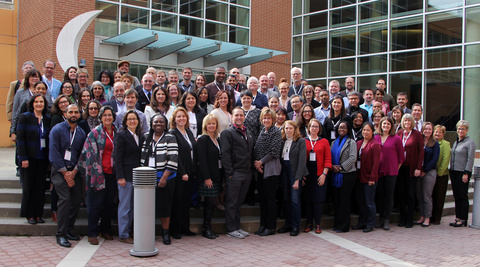ECEP Alliance Convened for Annual Meeting January 26-27

The Expanding Computing Education Pathways (ECEP) Alliance, part of the University of Massachusetts Amherst's College of Information and Computer Sciences, held its Annual Meeting in Atlanta, Ga. January 26-27. The meeting gathered nearly 90 participants from 16 states and Puerto Rico. Attendees held positions in state departments of education, state boards of education, STEM centers, nonprofits, governor's offices, universities, and schools. The theme was Measuring What Matters: Broadening Participation in Computing (BPC) in the States, and the meeting focused on four strategic areas of BPC work: defining BPC, rethinking measurement systems, setting measurable goals, and building sustainable pathways.
The two-day work-intensive meeting, held at the Georgia Tech Global Learning Center, provided states with concrete data, goals, and information to move forward in their mission to broaden participation in computing - as well as to learn from each other's challenges and successes.
"It was energizing to be with so many passionate leaders who are working to improve computing education in their state," said ECEP principal investigator Mark Guzdial. "It's also amazing to see how much work there is to reach everyone with high-quality computing education."
ECEP state leaders presented on panels to share how they define and measure BPC, how they develop strategies for BPC, and how they develop equitable CS pathways. There were also state team work sessions, breakouts, and participant-defined "unconference" sessions that allowed participants to delve deep into topics most meaningful to their state.
Jan Cuny, NSF program officer, shared remarks on BPC from a national perspective and Kamau Bobb, senior director of Constellations Center for Equity in Computing, provided a riveting keynote. Bobb discussed the structural changes needed for equitable access to quality CS and STEM education, stating the "lack of diversity in computing is a problem we all own." He also pointed out the disconnect between what high school students are learning and what universities are expecting for entry into CS degree programs. "Coding is sexy, but math learning gets you into university," he said.
The event closed out with a panel on ECEP's evolution and future, followed by participant reflections on the annual meeting and the ECEP Alliance on a whole.
ECEP state members shared some parting sentiments in a survey conducted by SageFox Consulting Group:
- "Our partnership with ECEP is so vital to our continued work in BPC. I just can't imagine not having this support. The Alliance has affected systemic change at a level I don't think they even knew was possible."
- "ECEP has been an ideal model of collective impact by serving as our go-to connector in Texas to national expertise, resources, and funding."
- "Our focus has been primarily on K-12. My team and I gained a lot of insight into the next step of connections to 2- and 4-year pathways in higher ed and the BPC importance."
- "The opportunity for my state's officials - joining us in CS for All in our state - to know and share with national leaders in this field is invaluable."
Expanding Computing Education Pathways (ECEP) is a National Science Foundation (NSF)-funded Broadening Participation in Computing Alliance (BPC-A) that seeks to increase the number and diversity of students in the pipeline to computing and computing-intensive degrees by promoting state-level computer science education reform. ECEP supports 16 states and Puerto Rico to develop effective and replicable BPC interventions and to create state-level infrastructure to foster equitable computing education policies. The ECEP Alliance includes Alabama, Arkansas, California, Connecticut, Georgia, Indiana, Maryland, Massachusetts, New Hampshire, Nevada, North Carolina, Puerto Rico, Rhode Island, South Carolina, Texas, Utah, and Virginia. More information can be found at www.ecepalliance.org.